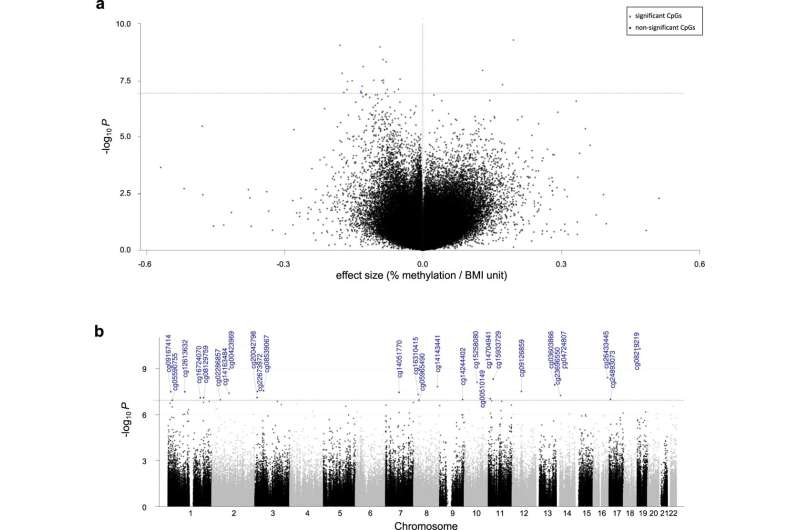This article has been reviewed according to Science X's editorial process and policies. Editors have highlighted the following attributes while ensuring the content's credibility:
fact-checked
peer-reviewed publication
trusted source
proofread
Maternal obesity can affect fetal development

Most people think that as the fetus grows in the womb, the mother will be the most important factor influencing the child's future health, and this factor will undoubtedly prevail over all other possible ones. This belief is widely held in society and much research focuses on the characteristics and behaviors of the mother throughout her pregnancy.
Such is the case in the work published recently in Communications Biology which has studied "the impact of the mother's body mass index at the beginning of pregnancy on the molecular profiles of the placenta, and more specifically on placental DNA methylation (addition of a group comprising one carbon and three hydrogens in a specific position in the DNA molecule)," said Nora Fernández-Jiménez, lecturer at the Faculty of Medicine and Nursing.
"This is the largest study on placental DNA methylation conducted so far, involving a total of 2,631 mother-child pairs from Europe, North America and Australia," she added.
In contrast to the more familiar mutations –the substitution of one nucleotide for another in the DNA sequence–, methylation is a modification of DNA that regulates gene expression without altering the sequence.
"Recent studies indicate that methylation is the bridge between the intrauterine environment and the fetal genome. For example, the level of methylation of a region of the genome may increase as a result of the environment. Such an increase generally leads to the DNA becoming more compact, and as a result, the transcription machinery cannot access these regions and some genes are silenced. The opposite could also occur, in other words, the level of methylation in certain regions of the genome decreases in response to the environment. In this case, the DNA obtains an open configuration to which the transcription machinery has better accessibility, and gene expression would be increased as a result. In both cases, the sequence remains intact but the genome behaves in one way or another," explained the UPV/EHU researcher.
"In this work we have identified 27 sites in which variations in DNA methylation are observed and which seem specific to the placenta," pointed out Fernández-Jiménez. It is worth remembering that the placenta is a fundamental organ in fetal growth and development, because it is the organ that connects the mother with the fetus and the organ through which the fetus is fed.
"Many of these identified sites are located near obesity-related genes and are enriched in metabolic pathways for cancer and oxidative stress. That doesn't mean that babies born to mothers with obesity problems will go on to develop cancer, but it is true that the placenta behaves like a tumor, it grows very quickly, and that leads us to think that there is an impact on the functioning of the placenta and fetal growth."
All these results suggest that placental DNA methylation may be one of the mechanisms by which maternal obesity is associated with adverse metabolic health outcomes in childhood, although Fernández-Jiménez stressed that further studies would be needed to corroborate these findings.
She went on to highlight the fact that "however legitimate our research may be, it should not be used to justify the mantra of mother-blaming, as it is very difficult to quantify the influence of mothers and their characteristics and behaviors versus other factors –mothers' parents or partners, families, society itself and the environment—surrounding the fetus and the newborn because they have never been so thoroughly researched."
More information: Nora Fernandez-Jimenez et al, A meta-analysis of pre-pregnancy maternal body mass index and placental DNA methylation identifies 27 CpG sites with implications for mother-child health, Communications Biology (2022). DOI: 10.1038/s42003-022-04267-y





















